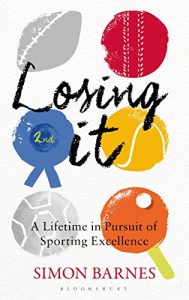To understand Anna Karenina, Mellors, Molly Bloom, Dante, Romeo, Juliet and Bridget Jones you must also have loved and lost and won. To understand sport in the greatest arenas of them all you too must have played and lost and won, known shame, hope, joy, horror and glory.
Simon Barnes has taken part in seven summer Olympic Games, five World Cups and ten Ashes series. Well, not exactly taken part, but certainly he was there and writing hard. And always, behind every victory and every defeat he ever recorded, there was the reference of his own sporting career, in which the bitter beauties of failure were occasionally varied with the intoxication of success.
At school he was – at least at first – the opposite of a rebel without a cause: he was a sporting fool in search of a game he could excel at, alas finding none. When he was nine he thought he would somehow be miraculously good at sport. Sadly he never was. But the sporting fool within him never died and in his late 20s he tried again – a second sporting career, in which the triumph of hope over experience was more or less a rout. The dream had only slightly modified: he now thought he would be somehow be miraculously competent.
So he co-founded a football team and at last found himself the first-choice goalkeeper. Then he co-founded a cricket team, on the grounds that by doing so he would always be sure of a game. And at the same time, he got horsiness and discovered he was actually quite good at riding in competition.
All these adventures taught him about sport: why we do it, what is required to be very good at it. He learned about the relationship of physical and mental skills, about fear and courage and physical pain. He learned about funk, about Zen-like calm, about the team thing, about the "me" thing. His sporting failure has been a joyous and profoundly informative part of his life, and here he tells the story of it.
Simon Barnes has taken part in seven summer Olympic Games, five World Cups and ten Ashes series. Well, not exactly taken part, but certainly he was there and writing hard. And always, behind every victory and every defeat he ever recorded, there was the reference of his own sporting career, in which the bitter beauties of failure were occasionally varied with the intoxication of success.
At school he was – at least at first – the opposite of a rebel without a cause: he was a sporting fool in search of a game he could excel at, alas finding none. When he was nine he thought he would somehow be miraculously good at sport. Sadly he never was. But the sporting fool within him never died and in his late 20s he tried again – a second sporting career, in which the triumph of hope over experience was more or less a rout. The dream had only slightly modified: he now thought he would be somehow be miraculously competent.
So he co-founded a football team and at last found himself the first-choice goalkeeper. Then he co-founded a cricket team, on the grounds that by doing so he would always be sure of a game. And at the same time, he got horsiness and discovered he was actually quite good at riding in competition.
All these adventures taught him about sport: why we do it, what is required to be very good at it. He learned about the relationship of physical and mental skills, about fear and courage and physical pain. He learned about funk, about Zen-like calm, about the team thing, about the "me" thing. His sporting failure has been a joyous and profoundly informative part of his life, and here he tells the story of it.






